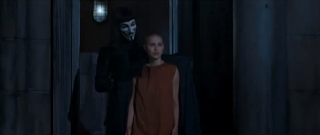This scene comes after the incident with Kevin's sister. His chilling attitude for his sister makes this one of the most disturbing scenes in this film. What makes this more disturbing is the way Kevin peels a lychee fruit with an almost devilish glee. The scene begins with the camera at a medium long shot so that Kevin is at the head of the table while Eva and Franklin are placed secondary to him, as if to say that Kevin has control over them, that he can do anything he wants. For the main part of this scene is that the actors are placed in the middle of the shot. Ignoring the rule of thirds the director takes risks in whether the audience will find that this scene lacks in something, however the results are quite the opposite as the setup intrigues the viewer. The way that the shot is setup when Kevin eats the lychee is clever because during the whole scene Kevin taunts Eva in a way that isn't obvious to his father, Walter. Then when Kevin eats the lychee we can see the juice that spurts out of the lychee, we can also see a close-up of him chewing it. What makes this part of the scene so sinister is that we can also hear the squirting of the juice coming out from the lychee. There is very little sound when nobody is speaking so that we hear the silence in the room, at best we hear the subtle clinking of glasses and knives and forks. As for the props, kitchen utensils and food is needed as it fits with the set. Without these, the scene would not get the desired effect that it has on the audience. I think the most essential thing in this scene is the sound and that fact that its so minimalistic which makes it so cold.
Wednesday 23 October 2013
Juno - MACRO
Important scene in Juno:
This scene comes near the end of the film when the plot is reaching its resolution. The scene consists of Juno and her father talking in the kitchen. She discusses with him her love life briefly, "...find a person who loves you for exactly what you are," says Juno's father in which Juno replies, "I sort of already have". This is when she questions "relationships", i.e., between not only her and Bleeker but between a mother and her unborn child, a couple who are facing a major cross road in their marriage, her father and his second marriage, and even her best friend's crush on a high school teacher. The scene was shot in a fairly small set as judging by their intentions I think the idea was to make it intimate as Juno was discussing something personal with her father. With dimmed lighting to create a better ambience it ties the scene together. The camerawork is manly shot over-the-shoulder each time the character speaks to another, this is mainly shot like this because its a conversation between the two. When the scene begins, Juno comes out from behind the kitchen countertop, almost as if to show her pregnant belly so it's almost as if she's saying that she's not covering up anymore and it shows that she's about to open up. The scene has been edited so that we see the over-the shoulder camera angles one after the other. This would have been filmed separately and then collected together for editing. Juno starts the scene by talking quietly but as she opens up more her voice gets louder to represent her finding her voice. The props inside the scene fit with the set because if they don't fit with the set then it distracts the viewer from the acting in the scene.
Saturday 19 October 2013
Recreation V for Vendetta scene comparison
Realistically, our swedes that we made were not going to be exactly the same. Although, comparing the two clips, there are similarities and ideas that are the same.
Original Swede
This is the beginning of the clip where we see a man with a hat who is V. When re-creating this part of the clip, V was played by Nick and we used a hat and a coat for our props. I think the lighting could have been better although it was difficult to get the same lighting as the original clip because this part was filmed outside in the dark. Unfortunately we didn't have that opportunity so we used a dark room instead.
This part of the clip shows Chancellor Sutler's speech, in which for our swede, Aaron played Chancellor Sutler. For our props we used a hoodie and a strip of red paper to show the nazism that comes across in this scene. Our lighting could have been better but again it was hard to get it right as we filmed it in a dark room. We could have filmed it outside although it would have been hard to get the same black backdrop.
These pictures from the scene show the marching army of Chancellor Sutler, for the swede we were able to get all the props as in the original image such as black trousers and boots. However I think we were able to get the point across of a large force of people.
It was hard to re-create this part of the scene because the mise-en-scene was difficult to re-create exactly. However, I think that we used our resources well in order to get the idea across. Our mise-en-scene was shot in the cafe in which we try to get the emotion across from the dying prisoners.
These pics shows the part of the scene we re-created last, however our swede looks different because it was filmed in a portrait view which makes it look different to the other shots we filmed. We did try to use the mise-en-scene that we had, however it doesn't look similar to the original but the ideas are still there.
Friday 18 October 2013
Juno - Representation of Parenthood
Ellen Page, who plays Juno MacGuff in the film Juno, portrays a teenager in the stages of her unplanned pregnancy. The style in Juno is similar to We Need To Talk About Kevin because they have both clever and quick dialogue. Juno is shown as a struggling teenager who forms a bond with her unborn that leads to difficult decisions later. This could relate to We Need To Talk About Kevin because Kevin could be because of the relationship between him and his mother. In Juno, she faces the fact that giving her children up for adoption would result in changing her child's life and breaking the bond between her and her child.
We Need To Talk About Kevin - Representation of Parenthood
Where does the responsibility lie?
The main point to question in We Need To Talk About Kevin is whether the result of Kevin is because he was naturally a born sociopath or whether it was result of bad parenthood from the mother Eva, played by Tilda Swinton. I think this is what the film is trying to get across in the film as they mainly focus on the relationship the mother and son, this is because they want to show the struggle that Eva has to go through. The father, played by John C. Reilly, doesn't seem to get blamed for the outcome of Kevin because throughout his son's childhood he seemed ignorant of Kevin's chilling actions that results in a mutual hate with Eva, the mother.
What is stylised dialogue?
Stylised dialogue is how a writer writes his script. For example if you were writing for a film in the Victorian era then you would write in language similar to Shakespeare. Whatever film you're writing about, the dialogue has to fit with the time and genre as 'genre changes over time'. Examples of stylised dialogue writers would be:
Hal Hartley (right) is best known for the characters he creates which are notable for deadpan humour and offbeat characters quoting philosophical dialogue. This is his stylistic dialogue and the way he writes.
David Mamet (left) is best known for his fast, clever and edgy writing styles that often fit with his characters that are tough and get what they want by controlling each other. Such as interrupting each other and swearing. It also fits in with the time and genre of his films.
Hal Hartley (right) is best known for the characters he creates which are notable for deadpan humour and offbeat characters quoting philosophical dialogue. This is his stylistic dialogue and the way he writes.
Thursday 17 October 2013
Children of Men - Key Messages and Ideas WORK FOR HALF-TERM
There's a lot of deeper meaning to Children of Men, this would be to do with the messages that they get across in the film. The film shows the struggle of Theo, played by Clive Owen, in his journey to save Kee, played by Clare-Hope Ashitey, who is pregnant.
In this first picture it is near to the beginning of Theo's journey, and the pain that he has to go through. Below shows Julian, played by Julianne Moore, after being shot by activists. What makes this even more saddening is the relationship between the two characters Theo and Julian because at the beginning of the film it seemed like an old romance is being re-kindled before she was shot. The significance of this could be referring the destruction of love and how badly corrupt this dystopian government has become.
For one this picture is significant because it relates to the main Children of Men film poster of the character Theo staring out of broken glass. What's particularly significant about this picture is that he's looking out of the broken glass onto Kee, who brings for hope in the film. So this must be hinting that there is hope for the broken country.

This scene shows the birth off Kee's baby, aided by Theo who helped with getting Kee a place to stay and give birth. The film touches on the idea of religion because Theo and Kee are almost like Joseph and Mary, as he finds a place for her to stay. So this scene here could be referring to the birth of Jesus, because in Christianity he gave faith as Kee's baby gave faith to the dystopian nation and united everybody. The idea that one baby can save mankind after years of nobody reproducing is an example of verisimilitude, because this idea is believable because of the dystopian theme throughout the film.
This image shows Theo protecting Kee and the baby from any gunshot. The scene is showing the soldiers stopping their gunfire for Theo and Kee because they realise that she's carrying a baby. This is one of the first signs of hope in the film because it shows that even in war where life is destroyed, a life can be born. It also shows how they are becoming more united as they protect Kee and her child.
Throughout the film it's clear that hope and faith is the main message and idea and producers are trying to get through. There is also a portrayal of fear in the film, this is because fear is installed in the refugees to control them and only when Theo loses all fear, he then continue to save mankind.
What is an independant film? WORK FOR HALF TERM
An independant film is a term used to describe a film that is filmed and produced independently. This means it uses its own funds and is not made by the big movie studios such as Universal, Paramount etc. They have lower budgets than major films use. An example of independent film producer could be:
Django Unchained Stylistic Dialogue WORK FOR HALF TERM
This clip is about Klu Klux Klan (KKK), a white-american extremist organisation that was created after african-americans won their freedom from slavery. This clip that was in Django Unchained makes fun of the group and their racist views. At the beginning of the clip, the atmosphere is very tense and the surrounding men seem very sinister and scary with their masks. However as the clip progresses, we can see that the extremists are far from scary and sinister as the leader struggles with the organisations signature masks, which helped mask their identity. Although when removed, their faces and voices portray average and slightly stupid men, which makes this a funny mock clip about the KKK. The actors in this scene speak with accent from where the KKK originated.
Assessed Writing
The film 'V for Vendetta' represents a dystopian future where revenge is portrayed through one of the main characters, V, in which he threatens the fascist life that is created by the deceitful government, in order to get revenge and gain freedom. The moral that freedom is more important than life, is represented throughout this film. Revenge is one of the main themes throughout the film, as V wants to get back at the government for the unjustified experiments that killed thousands of people in order to create a perfect race, including V himself where he was disfigured by the mistakes of the government. The theme of Guy Fawkes is also present in the film, whether it's shown through the masks worn on V in order to hide his true identity or whether its the symbolic reference to blowing up the parliament in the final scene. The government uses fear to control the people, whether its the fascist views that has some references to Hitler, especially Chancellor Sutler's speech, with Nazi type flags and uniform. This sets the scene for the film. V tries to get across the idea that you shouldn't trust your government as they are all responsible for their future and they all the antagonist, even V himself, however we see him as the protagonist as his views are justified. When people are united through an idea there is no stopping what can happen. This was the message that V was trying to get across, and as V said in his scene with Creedy, "Ideas are bullet proof". The idea that we support both an antagonist and terrorist that is V, is that his ideas and means are justified, this would be another moral that is taught that terrorism is condemned as long as it's justified. This is what I think the film is trying to say as we see V as everyone, as everything that has happened to their government; damaged, broken and corrupt.
V for Vendetta Swede
Editing and credit to Briony: http://brionysfilm.blogspot.co.uk/
These videos are from the other group which was Ben, Priscilla, Nick and Anna's group in which we helped with the filming lighting and acting in some scenes.
In our group was Briony, Adam, Nick and I. Our tasks was to re-create a scene which shows British National Identity. We worked together with Ben, Priscilla, Aaron and Anna to help each other with filming so that we would have enough actors for our scene. I enjoyed filming for these scenes as it helped me understand the mise-en-scene that goes into the different scenes. I had different roles in shooting the scenes, such as filming, lighting and props. I believe that in each of these I have contributed well. Improvements that could have been made would be that the sound for some of the video is low quality because these were filmed further away from the actor then other scenes. We could improved this if the actor spoke louder when the camera is further away.
Examples of gender roles in this scene could be Chancellor Sutler, played by Aaron, who shows power by enforcing fear in his audience. It tells the story of how the nation has been deprived of freedom and relates to the narration, done by Nick.
Examples of gender roles in this scene could be Chancellor Sutler, played by Aaron, who shows power by enforcing fear in his audience. It tells the story of how the nation has been deprived of freedom and relates to the narration, done by Nick.
These videos are from the other group which was Ben, Priscilla, Nick and Anna's group in which we helped with the filming lighting and acting in some scenes.
Tuesday 15 October 2013
Juno and We Need to Talk About Kevin film comparison
How is parenthood represented throughout the two films?
Parenthood in Juno is represented similar to parenthood in We Need to Talk about Kevin in a way because the mother, Ellen Page, struggles the most during her pregnancy because she carries the child and suffers the symptoms of pregnancy, whereas the dad does not suffer.
We Need to Talk about Kevin is similar to Juno because the mother of Kevin, Eva, struggles more with raising her son than her husband, Frank does. This shows us that she is struggling more than her partner like Ellen in Juno.
Similarities:
- They both aren't conventional, and don't fit the classic hollywood narrative.
- Both involves the struggles of parenthood.
- They both involve the struggles of motherhood and the bond between a child and its mother.
Differences:
- We Need to Talk About Kevin is more of a psychological thriller whereas Juno is more of a smart comedy.
- We Need to Talk About Kevin involves the growth of Kevin, the son, whereas the child in Juno isn't shown older in the film.
Gender roles in V for Vendetta scene
What significant examples are there of gender roles in the characters?
This moment when Evey comes through the door could be yonic imagery which could represented Evey being born again as she has got rid of her fear. Also she has lost her femininity as she has had her hair shaven, with in turn has given her power and strength.
V is cradling her head which would be as if he was her father figure because he's protecting her when she's vulnerable and in an emotional state. He's gets down to her level in order to sympathise with her and connect with her.
He tries to shelter her from the rain with his coat, this is yet again another relation to a father figure symbol. But she refused to wear it, almost as if to say she doesn't want to be sheltered anymore.
This image represents Evey showing power and strength and she has been released from her imprisonment. It also shows how she's reborn again as it relates to baptism because she is baptised by the rain. She is looked on by V so this could again be a father figure symbol.
Monday 14 October 2013
Objectification of Women
Women in 'V for Vendetta' and 'Children of Men' are represented differently, for example in Children of Men the women are represented as vulnerable and should be protected. This is shown throughout most of the film when the main protagonist protects the only pregnant women for years, she is shown as fragile and scared, only with the help of the main protagonist, a male, she is saved.
However, in V for Vendetta, one of the main protagonists, Evie, is a women, therefore the representation of women is different because Evie is seen as an action women. But this is only possible after she overcomes the torture that she is put through by the male protagonist, V. During this time of the film she is only able to gain her strength when she has overcome her fear of dying.
The main female character in Children of Men, who is pregnant, could represent the future dystopian Britain because even though the views are corrupt, she shows hope with the idea that a baby can be born. Without her, there would be no quest for the hero to finish and nothing to unite the nation.
Evie from V for Vendetta could represent the country being reborn again. This is shown through the scene with V after Evie finds out the V was the one who tortured her. She is able to gain strength back after she is 'baptised' with the rain. She also refuses shelter from V which shows that she's the dominant character in the scene.
The main female character in Children of Men, who is pregnant, could represent the future dystopian Britain because even though the views are corrupt, she shows hope with the idea that a baby can be born. Without her, there would be no quest for the hero to finish and nothing to unite the nation.
Evie from V for Vendetta could represent the country being reborn again. This is shown through the scene with V after Evie finds out the V was the one who tortured her. She is able to gain strength back after she is 'baptised' with the rain. She also refuses shelter from V which shows that she's the dominant character in the scene.
Tuesday 8 October 2013
How does the film represent dystopian britain as a nation?
This image here shows Chancellor Sutler leading a rally just like Adolf Hitler did with his speech. also the flag is similar to the Nazi flag. This could reflect that the ideals of the government could reflect the ideals of the Nazi party. Another point that this film represents a dystopian Britain is that there is no sign of a British flag, which could show how they have have removed the national British identity.
V for Vendetta Character Priest scene
Do the characters use or challenge the stock characters of the genre and how does this create meaning?
This image represents the character that is the bishop as the stock character of the 'Whisky Priest', which is where his morals do not abide to the norm of the religious status. In this case, the bishop in the scene is with Evey, posing as a prostitute, dressed as a young girl. It also symbolic that the painting of Jesus on the cross is also in the scene as this shows that his religion is looking down on the bishop, judging him. It could also be there to show that there are eyes on the bed, to show clues of the sins that are about to partake there.
Evey acts as a helpless young women, who as her stock character, would be a 'Damsel in Distress', as she is trying to fight but is struggling. It doesn't help that Evey is dressed as a innocent young girl.
In this picture, V is the 'Lone Vigilant' as he bursts through the doors saving Evey from the bishop, all with a low camera angle, as seen here, to make V look more powerful than the others in the scene. He protects Evey from the bishop which could show how he is also a hero as well.
Tuesday 1 October 2013
Dystopia MOODBOARD
These images are mainly based on the film 'Children of Men', as based on the stereotypical features of a dystopian environment, 'Children of Men' fits it. Such as the corrupt views that have been stipulated by the government and the breakdown of human life.
Subscribe to:
Posts (Atom)




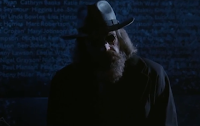

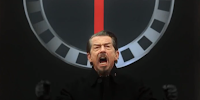





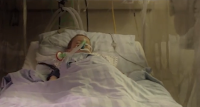









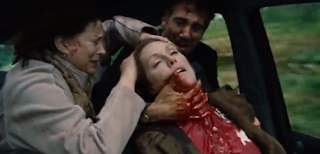




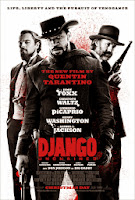

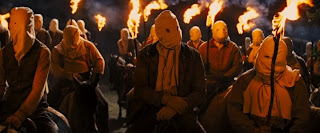

.jpg)


